

| Circe
| Monday, January 25, 2010 With the hull painting complete, I spent the first part of the day removing the tape, paper, and plastic from the hull and deck, cleaning up, and reorganizing. I rebuilt the staging at deck height, and prepared for the remaining work ahead. I placed orders for some of the materials I planned to use over the next week or two as I began some of the systems installations. |
|
First and most important on today's list was a planned visit by the canvas contractor, Mobile Marine Canvas, slightly delayed from a little over a week ago. But Seth wouldn't arrive till late in the morning, so in the meantime I started work on some interior trim. I began with the curved blank that I built a couple weeks ago, which I'd intended to use to trim out the transition between the saloon liner and the forward part of the cabin. I planed and sanded it smooth to remove excess epoxy squeezeout, and then planed it down to 1-1/2" overall width. I made several trips back and forth to the boat, trimming and shaping the piece further each time, in an attempt to fit it in place. Each time, I became increasingly unsure as to whether the blank would do what I'd envisioned it might, so I was glad when Seth arrived and I could put the piece aside for the moment and think about how to proceed. |
|
I spent the remainder of the day with Seth as we determined the various specifics of the dodger design as related to this specific boat: height, frame placement, profile, windshield rake, and other considerations. By mid-afternoon, and after several test-fits and frame cuts, we had the basic frame shape and position determined, and Seth could install the frame mounting points and the three-piece curved rope groove track that would define the forward edge of the dodger. The size and shape of the frame was determined by a variety of angle determinations and overall span between points of the frame, in conjunction with the confine the boat itself. For the windshield, I wanted to replicate, as closely as possible, the angle found on the doghouse bump, a few feet forward, which would help the dodger flow naturally with the design of the boat. This angle, which turned out to be 50°, brought the lower leading edge of the windshield a few inches further forward than it might have otherwise been, but the initial appearance--as defined by strips of tape and imagination--proved to be effective. |
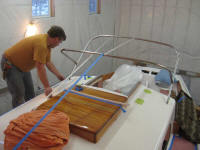
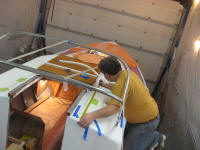
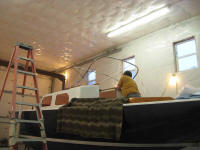 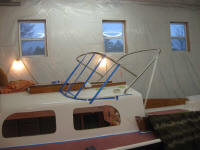
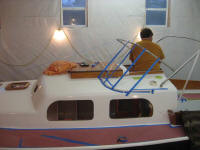
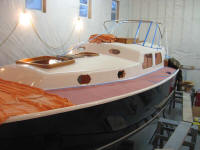 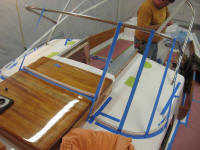
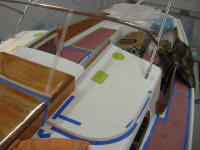
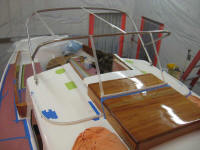 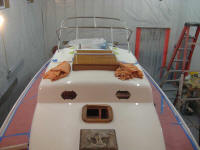 |
|
This brought things to the end of the day; the dodger template would continue tomorrow, along with the templates for the interior cushions. |
|